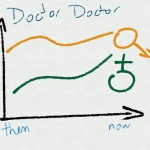UK auto disqualified after poor lifting

In the aftermath of Brexit, the pointy finger of blame has fallen squarely on the rise of conservative patriotism, racism and the stench of economic stagnation among the working poor.
But when analysing the economic situation of UK’s households over the last few decades, it’s hard to see what Brexiters are complaining about.
While American working class wages got stuck in the 1970s, the UK’s have been rising steadily, especially since 1990. In fact since Thatcher lost office, the poorest 40% of households have seen their disposable income increase at twice the rate of the rest of the country.

(I use disposable income as it’s a more complete measure of a household’s situation than wages. It includes all income (private and government cash benefits) and removes direct taxes (income tax). It’s the money which lands in people’s pockets.)
After adjusting for inflation, household disposable income grew by 71% for the poorest 20% of households, and 59% for the 2nd poorest since 1990. The rest of the UK only grew by 34%.
The poor are not only getting richer in absolute terms, but also in relative terms.

Firstly, absolute growth
The poorest quintile has seen their disposable income increase from £7,200 in 1990 to £12,300 in 2014/15 (after inflation). The second poorest quintile increased from £12,400 to £19,800. No matter how hard life is today for poor households, it would be a lot worse with £6,000 less a year.
To put this growth in perspective, we can compare today’s poor households to that of people in the past. Today’s 2nd poorest quintile earns the same as the middle quintile earned in 1990. And going back a bit further, they earn the same that the 2nd richest quintile did in 1977, just before Thatcher took office. So, the economic situation of the working class today is similar to that of the upper middle classes when the (Royal variety) Queen celebrated her Silver Jubilee, and Queen (of the Freddy Mercury variety) released “We are the champions”.
Secondly, relative growth
As the poor households’ earnings grew faster than the rich ones, the relative gap has decreases considerably. The disposable income ratio of richest to poorest was 7 at the end of the Iron Lady’s regime. Today that figure is 5.4. Likewise, the ratio between the 2nd richest and 2nd poorest quintiles dropped from 2.4 times to 2.0. Of course, the ratio is still too large, but a 23% drop is worth noting.
Since GFC
The figures above look at the UK since the departure of Lady Thatcher in 1990, but what about a more recent focus?
Well, the picture is even rosier (relatively speaking) for the lowest quintile over the past 7 years. While the richest 2 quintiles dipped between 5-10% around 2011-12, and have only just returned to pre-crisis levels, the poorest quintile now earns 11% more than they did in 2007/08, and never went behind pre-crisis levels over the period. The 2nd lowest earners hovered steadily, but over the past 2 years increased to a small increase over pre-crisis levels.

A historical lens
A longer search shows that this was not always the case. The last dark age for the lower classes was clearly under Thatcher. During Margaret’s 11 year regime, the disparity between rich and poor climbed steeply. While the richest households in the UK experienced a 46% increase in real disposable income, the poorest 2 quintiles only increased by 11 and 13%. This resulted in the income ratio of richest to poorest to rise from 4.9 to 7 in an 11 year period.

It’s taken the following 25 years to bring this disparity back to pre-Thatcher levels for 2nd richest to 2nd poorest, but the Richest to poorest ratio is still much higher than it was in the late 70s.

Show me the money
Here’s where it gets super interesting. It would be easy to assume that seeing as the end of Thatcherism marked the turning point for income distribution; government handouts would be somewhat responsible for the change. But that is far from the truth. The income growth for the poorest has been largely driven by increases in private income. Since 1990, private income for the poorest has increased by 168%, while Government support only increased 22%! The opposite was surprisingly true under Thatcher, when the bulk of the poor’s income increases came from government benefits.

Since 1990, Government support has increased the least for the poorest quintile, in relative AND absolute terms. While the government now gives the poorest quintile £1,400 more than they did in 1990 (after inflation), they also give middle income earners an extra £3,400, and the richest quintile an extra £1,700 per year, after inflation.

Brexit due to a lack of jobs available
Yeah, nah. Unemployment has not been lower than current rates since the mid-70s. Sure there was a momentary blip from the 2008 crisis, but not only did that not reach the unemployment levels seen in the 80s and 90s, it also finished a year ago. People should be high on finding employment at the moment.

It’s not you, it’s tax
Even income tax hasn’t been lower in the last 40 years. The poorest households now pay 5 percentage points less in tax than they did 25 years ago, and the middle and upper middle classes have dropped around 3 percentage points. The only section of the community paying more tax (per household) are the richest 20%, and even they only pay less than 1 percentage point more than they used to.

So, what the heck are Brexiters complaining about?
Overall the economic situation in the UK has been favourable across the community, and in particular the poorest sections.
- Income is considerably up
- Inequality is slightly down
- Unemployment is at its lowest point in the last 40 years, and
- Brits have not paid less in taxes in at least 40 years.
Furthermore, the government is increasingly supporting the middle and upper classes through direct cash benefits, so they can hardly complain about the support being handed out to those (arguably) more deserving.
What’s that leave us with
If Brexit was a vote of discontent at the current economic situation, it was a result of perception more than reality. More likely, it was a vote from fear. A xenophobic reaction to the constant hysteria bombarded at the populous, misleading on the current situation. The world is not getting worse. Neither from within, economically, nor from outside evils.
Time for more reasoned responses, from a better informed community.
Sources
All data is sourced from the Office of National Statistics (ONS) UK.
http://www.ons.gov.uk/peoplepopulationandcommunity/personalandhouseholdfinances/incomeandwealth/bulletins/householddisposableincomeandinequality/financialyearending2015
http://www.ons.gov.uk/employmentandlabourmarket/peoplenotinwork/unemployment/timeseries/mgsx/lms
















